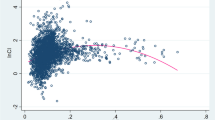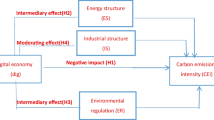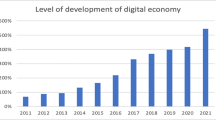Abstract
China is in the period of vigorously developing the “digital economy” and “low-carbon economy,” facing the double pressure of realizing the “dual-carbon” target and maintaining stable economic growth. This paper tests the role of the digital economy (DIEC) in the process of carbon emission reduction for the advancement of low carbon economy based on this issue from the perspective of carbon intensity (CI) by constructing a fixed effects and mediation effects model using data from 30 areas from 2011 to 2021. The study results show that at the national level, the advancement of DIEC significantly inhibits CI, and the conclusion still holds after various robustness tests. From the geographic region level, the suppression of CI by digital economic advancement has the most substantial impact in the central region. Although the eastern and western areas have similar results, the significance level is higher in the east region. When considering the economic development level, the impact of DIEC on CI is more significant in areas with lower economic development than those with higher economic growth. In analyzing the path of the DIEC affecting CI, it is found that the DIEC mainly inhibits CI by promoting technological advancement and reducing energy consumption intensity.
Similar content being viewed by others
Data availability
Not applicable
Notes
See more detail: http://www.stats.gov.cn/
See more detail: https://www.ceads.net.cn/
References
Akhtar MJ, Azhar M, Khan NA, Rahman MN (2023) Conceptualizing social media analytics in digital economy: an evidence from bibliometric analysis. J Digit Econ 2:1–15
Bai D, Du L, Xu Y, Abbas S (2023a) Climate policy uncertainty and corporate green innovation: evidence from Chinese A-share listed industrial corporations. Energy Econ 127:107020
Bai T, Qi Y, Li Z, Xu D (2023b) Digital economy, industrial transformation and upgrading, and spatial transfer of carbon emissions: the paths for low-carbon transformation of Chinese cities. J Environ Manag 344:118528
Balat MMYC (2007) Status of fossil energy resources: a global perspective. Energy Sources Part B 2(1):31–47
Cao J, Law SH, Samad ARBA, Mohamad WNBW, Wang J, Yang X (2022) Effect of financial development and technological innovation on green growth—analysis based on spatial Durbin model. J Clean Prod 365:132865
Carlsson B (2004) The digital economy: what is new and what is not? Struct Chang Econ Dyn 15(3):245–264
Chen S, Ding D, Shi G, Chen G (2022) Digital economy, industrial structure, and carbon emission: an empirical study based on a provincial panel data set from China. China Popul Resour Environ 20(4):316–323
Chen L, Lu Y, Meng Y, Zhao W (2023) Research on the nexus between the digital economy and carbon emission-evidence at China’s province level. J Clean Prod 413:137484
Cheng Y, Zhang Y, Wang J, Jiang J (2023) The impact of the urban digital economy on China’s carbon intensity: spatial spillover and mediating effect. Resour Conserv Recycl 189:106762
Dong F, Hu M, Gao Y, Liu Y, Zhu J, Pan Y (2022) How does digital economy affect carbon emission? Evidence from global 60 countries. Sci Total Environ 852:158401
Du L, Wei M, Zhang S, Pan J (2023a) Unveiling the policy intervention effects of natural resource regulation on firm-level pollution emissions: evidence from China’s restrained land supply. Resour Policy 86:104081
Du Y, Zhou J, Bai J, Cao Y (2023b) Breaking the resource curse: the perspective of improving carbon emission efficiency based on digital infrastructure construction. Resour Policy 85:103842
Fan M, Yang P, Li Q (2022) Impact of environmental regulation on green total factor productivity: a new perspective of green technological innovation. Environ Sci Pollut Res 29(35):53785–53800
Guo F, Wang J, Wang F, Kong T, Zhang X, Cheng Z (2020) Measuring China’s digital financial inclusion: index compilation and spatial characteristics. China Econ Q 19(4):1401–1418
Guo B, Wang Y, Zhang H, Liang C, Feng Y, Hu F (2023) Impact of the digital economy on high-quality urban economic development: evidence from Chinese cities. Econ Model 120:106194
Hao Y, Li Y, Guo Y, Chai J, Yang C, Wu H (2022) Digitalization and electricity consumption: does internet development contribute to the reduction in electricity intensity in China? Energy Policy 164:112912
Holechek JL, Geli HM, Sawalhah MN, Valdez R (2022) A global assessment: can renewable energy replace fossil fuels by 2050? Sustainability 14(8):4792
Hosan S, Karmaker SC, Rahman MM, Chapman AJ, Saha BB (2022) Dynamic links among the demographic dividend, digitalization, energy intensity and sustainable economic growth: empirical evidence from emerging. J Clean Prod 330:129858
Hu J (2023) Synergistic effect of pollution reduction and carbon emission mitigation in the digital economy. J Environ Manage 337:117755
Huang Q, Yu Y, Zhang S (2019) Internet advancement and productivity growth in manufacturing industry: Internal mechanism and China experiences. China Ind Econ 8:5–23
Li Z, Wang J (2022) The dynamic impact of digital economy on carbon reduction: evidence city-level empirical data in China. J Clean Prod 351:131570
Li C, Razzaq A, Ozturk I, Sharif A (2023a) Natural resources, financial technologies, and digitalization: the role of institutional quality and human capital in selected OECD economies. Resour Policy 81:103362
Li G, Li X, Huo L (2023b) Digital economy, spatial spillover and industrial green innovation efficiency: empirical evidence from China. Heliyon 9(1):e12875
Li H, Han J, Xu Y (2023c) The effect of the digital economy on services exports competitiveness and ternary margins. Telecommun Policy 47(7):102596
Li Q, Chen H, Chen Y, Xiao T, Wang L (2023d) Digital economy, financing constraints, and corporate innovation. Pac Basin Financ J 80:102081
Li X, Wang H, Yang C (2023e) Driving mechanism of digital economy based on regulation algorithm for advancement of low-carbon industries. Sustain Energy Technol Assess 55:102909
Li Y, Li N, Li Z (2023f) Evolution of carbon emission in China’s digital economy: an empirical analysis from an entire industry chain perspective. J Clean Prod 414:137419
Lyu K, Yang S, Zheng K, Zhang Y (2023) How does the digital economy affect carbon emission efficiency? Evidence from energy consumption and industrial value chain. Energies 16(2):761
Ma Q, Tariq M, Mahmood H, Khan Z (2022) The nexus between digital economy and carbon emissions in China: the moderating role of investments in research and development. Technol Soc 68:101910
Mhlanga D (2020) Industry 4.0 in finance: the impact of artificial intelligence (ai) on digital financial inclusion. Int J Financ Stud 8(3):45
Myovella G, Karacuka M, Haucap J (2020) Digitalization and economic growth: a comparative analysis of Sub-Saharan Africa and OECD economies. Telecommun Policy 44(2):101856
Oloyede A, Fark N, Noma N, Tebep E (2022) Measuring the impact of the digital economy in developing countries: a systematic review and meta-analysis. available at SSRN 4106167
Ozturk I, Ullah S (2022) Does digital financial inclusion matter for economic growth and environmental sustainability in OBRI economies? An empirical analysis. Conserv Recycl 185:106489
Ozturk I, Razzaq A, Sharif A, Yu Z (2023) Investigating the impact of environmental governance, green innovation, and renewable energy on trade-adjusted material footprint in G20 countries. Resour Policy 86:104212
Pan J, Peng J, Yang X, Xuan S (2023) Does water rights trading promote resources utilisation efficiency and green growth? Evidence from China’s resources trading policy. Resour Policy 86:104235
Peng HUO, Luxin WANG (2022) Digital economy and business investment efficiency: inhibiting or facilitating? Res Int Bus Financ 63:101797
Peric K (2015) Digital financial inclusion. J Paym Strateg Syst 9(3):212–214
Ran Q, Yang X, Yan H, Xu Y, Cao J (2023) Natural resource consumption and industrial green transformation: does the digital economy matter? Resour Policy 81:103396
Razzaq A, Sharif A, An H, Aloui C (2022) Testing the directional predictability between carbon trading and sectoral stocks in China: new insights using cross-quantilogram and rolling window causality approaches. Technol Forecast Soc Chang 182:121846
Razzaq A, Sharif A, Ozturk I, Yang X (2023) Central inspections of environmental protection and transition for low-carbon Chinese cities: policy intervention and mechanism analysis. Energy Econ 124:106859
Saqib N, Ozturk I, Usman M, Sharif A, Razzaq A (2023) Pollution haven or halo? How European countries leverage FDI, energy, and human capital to alleviate their ecological footprint. Gondwana Res 116:136–148
Shahbaz M, Wang J, Dong K, Zhao J (2022) The impact of digital economy on energy transition across the globe: the mediating role of government governance. Renew Sustain Energy Rev 166:112620
Shang Y, Raza SA, Huo Z, Shahzad U, Zhao X (2023) Does enterprise digital transformation contribute to the carbon emission reduction? Micro-level evidence from China. Econ Financ 86:1–13
Siu RC (2023) Evolution of market power in China’s economic reform and its anti-monopoly policy: the case of Alibaba and Ant Financial Group. Rev Evol Polit Econ 4(2):249–273
Tao Z, Zhi Z, Shangkun L (2022) Digital economy, entrepreneurship, and high quality economic development: empirical evidence from urban China. Front Econ China 17(3)
Teshabaeva ON, Kodirova RA (2023) Analysis of methods for further development of the labor market to ensure employment in the digital economy. Best J Innov Sci Res Dev 2(4):74–78
Vechsuruck T (2023) Sectoral wage share and its decomposition in China. Int Rev Appl Econ 37(1):50–75
Wang L, Chen L (2023) Impacts of digital economy agglomeration on carbon emission: a two-tier stochastic frontier and spatial decomposition analysis of China. Sustain Cities Soc 95:104624
Wang J, Dong K, Dong X, Taghizadeh-Hesary F (2022a) Assessing the digital economy and its carbon-mitigation effects: the case of China. Energy Econ 113:106198
Wang J, Dong X, Dong K (2022b) How digital industries affect China’s carbon emissions? Analysis of the direct and indirect structural effects. Technol Soc 68:101911
Wang J, Luo X, Zhu J (2022c) Does the digital economy contribute to carbon emissions reduction? A city-level spatial analysis in China. Chin J Popul Resour Environ 20(2):105–114
Wang K, Su X, Wang S (2023a) How does the energy-consuming rights trading policy affect China’s carbon emission intensity? Energy 276:127579
Wang W, He Y, Lei Y, Gao W, Li Y, Lan H, Höök M (2023b) digital economy sectors are key CO2 transmission centers in the economic system. J Clean Prod 407:136873
Wang Y, Liu J, Zhao Z, Ren J, Chen X (2023c) Research on carbon emission reduction effect of China’s regional digital trade under the “double carbon” target –combination of the regulatory role of industrial agglomeration and Carbon emossion trading mechanism. Clean Prod 405:137049
Wang Q, Sun J, Pata UK, Li R, Kartal MT (2023d) Digital economy and carbon emissions: examining the role of threshold variables. Geosci Front 101644
Wu B, Yang W (2022) Empirical test of the impact of the digital economy on China's employment structure. Fin Res Lett 49:103047
Qi Y, Gao M, Wang H, Ding H, Liu J, Sriboonchitta S (2023) Does marketization promote high-quality agricultural development in China? Sustainability 15(12):9498
Xu Y, Ge W, Liu G, Su X, Zhu J, Yang C, Ran Q (2023) The impact of local government competition and green technology innovation on economic low-carbon transition: new insights from China. Environ Sci Pollut Res 30(9):23714–23735
Xue M, Razzaq A, Afshan S, Yang X (2023) Fiscal pressure and carbon intensity: a quasi-natural experiment based on education authority reform. Energy Econ 126:106919
Yang P, Fan M, Li Z, Cao J, Wu X, Wu D, Lu Z (2022a) Digital finance, spatial spillover and regional innovation efficiency: new insights from China. Electron Res Arch 30(12):4635–4656
Yang Z, Gao W, Han Q, Qi L, Cui Y, Chen Y (2022b) Digitalization and carbon emission: how does digital city construction affect China’s carbon emission reduction? Sustain Cities Soc 87:104201
Yang X, Liu X, Ran Q, Razzaq A (2023a) How does natural resource dependence influence industrial green transformation in China? Appraising underlying mechanisms for sustainable development at regional level. Resour Policy 86:104191
Yang X, Xu Y, Razzaq A, Wu D, Cao J, Ran Q (2023b) Roadmap to achieving sustainable development: Does digital economy matter in industrial green transformation? Sustainable Development 1–17. https://doi.org/10.1002/sd.2781
Yang X, Su X, Ran Q, Ren S, Chen B, Wang W, Wang J (2022c) Assessing the impact of energy internet and energy misallocation on carbon emissions: new insights from China. Environ Sci Pollut Res 29: 23436–23460
Yi M, Liu Y, Sheng MS, Wen L (2022) Effects of digital economic on carbon emission reduction: new evidence from China. Energy Policy 171:113271
Zhang L, Mu R, Zhan Y, Yu J, Liu L, Yu Y, Zhang J (2022a) digital economy, energy efficiency, and carbon emission: evidence from provincial panel data in China. Sci Total Environ 852:158403
Zhang W, Liu X, Wang D, Zhou J (2022b) Digital economy and carbon emission performance: evidence at China’s city level. Energy Policy 165:112927
Zhu Z, Liu B, Yu Z, Cao J (2022) Effects of the digital economy on carbon emissions: evidence from China. Int J Environ Res Public Health 19(15):9450
Funding
The authors acknowledge financial support from the research project on the integration and development of digital economy and real economy in Xinjiang (2022LY003) and research project on the development of digital economy in Xinjiang (2022ZJFLZ06). The usual disclaimers apply.
Author information
Authors and Affiliations
Contributions
RY: conceptualization; data collation; software; writing, original draft; and writing, review and editing. Bing Chen: data curation and validation. Jing Wu: theoretical analysis; writing, review and editing; funding acquisition; guidance; and supervision.
Corresponding author
Ethics declarations
Ethics approval
Not applicable
Consent to participate
Not applicable
Consent for publication
Not applicable
Competing interests
The authors declare no competing interests.
Additional information
Responsible Editor: Ilhan Ozturk
Publisher's Note
Springer Nature remains neutral with regard to jurisdictional claims in published maps and institutional affiliations.
Rights and permissions
Springer Nature or its licensor (e.g. a society or other partner) holds exclusive rights to this article under a publishing agreement with the author(s) or other rightsholder(s); author self-archiving of the accepted manuscript version of this article is solely governed by the terms of such publishing agreement and applicable law.
About this article
Cite this article
Yang, R., Chen, B. & Wu, J. Does digital economy curb carbon intensity? New insights from China. Environ Sci Pollut Res 30, 123214–123225 (2023). https://doi.org/10.1007/s11356-023-30767-3
Received:
Accepted:
Published:
Issue Date:
DOI: https://doi.org/10.1007/s11356-023-30767-3




